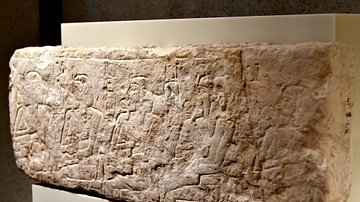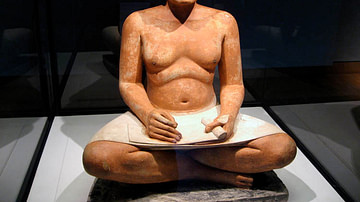Search
Did you mean: Pharaoh?
Remove Ads
Advertisement
Summary 
Loading AI-generated summary based on World History Encyclopedia articles ...
Search Results

Image
List of Five Pharaohs of the Egyptian Old Kingdom
This limestone fragment came from a New Kingdom tomb at Abusir/Saqqara, Egypt. The relief depicts five enthroned pharaohs, looking to the left. In front of the face of every one of them, a cartouche is inscribed. Only the cartouche at the...

Definition
New Kingdom of Egypt
The New Kingdom (c. 1570- c.1069 BCE) is the era in Egyptian history following the disunity of the Second Intermediate Period (c. 1782-1570 BCE) and preceding the dissolution of the central government at the start of the Third Intermediate...

Video
Greatest Pharaohs of Egypt
This video depicts the reign of a few of the greatest Egyptian Pharaohs between 1350 and 1070 BCE (during the New Kingdom). It is one video in a series. It also displays examples of monuments and artworks that correspond to the Pharaohs ruling...

Video
Famous Female Pharaohs and Queens of Ancient Egypt
There were many Female Pharaohs and Queens in Ancient Egypt who exercised amounts of power and authority, and this video will introduce you to the most famous ones. Spanning from the Early Dynastic Period with Neithhotep and Merneith, to...

Definition
Pharaoh
The Pharaoh in ancient Egypt was the political and religious leader of the people and held the titles 'Lord of the Two Lands' and 'High Priest of Every Temple'. The word 'pharaoh' is the Greek form of the Egyptian pero or per-a-a, which was...

Definition
Late Period of Ancient Egypt
The Late Period of Egypt (525-332 BCE) is the era following the Third Intermediate Period (1069-525) and preceding the brief Hellenistic Period (332-323 BCE) when Egypt was ruled by the Argead officials installed by Alexander the Great prior...

Definition
Hatshepsut
Hatshepsut (r. 1479-1458 BCE) was the first female ruler of ancient Egypt to reign as a male with the full authority of pharaoh. Her name means "Foremost of Noble Women" or "She is First Among Noble Women". She began her reign as regent to...

Article
Queen Hatshepsut: Daughter of Amun, Pharaoh of Egypt
Hatshepsut, whose name means "Foremost of Noble Women" or "First Among Noble Women" (royal name, Ma'at-ka-re, translated as "spirit of harmony and truth") was the fifth ruler of the 18th Dynasty (r. 1479-1458 BCE). She was the daughter of...

Article
Interrelations of Kerma and Pharaonic Egypt
The vacillating nature of Ancient Egypt's associations with the Kingdom of Kerma may be described as one of expansion and contraction; a virtual tug-of-war between rival cultures. Structural changes in Egypt's administration led to alternating...

Definition
Ancient Egyptian Government
The government of ancient Egypt was a theocratic monarchy as the king ruled by a mandate from the gods, initially was seen as an intermediary between human beings and the divine, and was supposed to represent the gods' will through the laws...